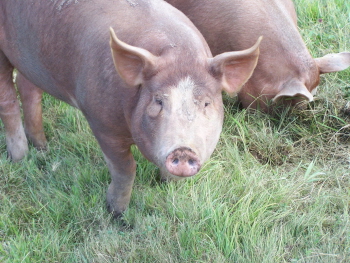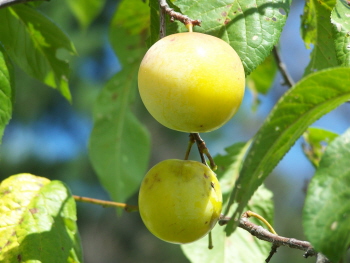Assessing & Planning
Getting Started
The story of Clover Valley Farms begins in 1996, even before Cindy and Jeff met. That was the year Cindy purchased the land. She comes from a rural background and has always loved gardening and imagined farming in some way. When Cindy and Jeff met through the Duluth Community Gardening Program, they started off with a shared interest. Jeff joined Cindy on the farm in 1999, and they immediately set about putting in a big garden, renovating the old homestead orchard, and pondering what else they could do with the farm.

Jeff and Cindy started experimenting with raising poultry in 2004. That first year they raised only 6 chickens for their own use. In 2005, their daughter May entered the picture and inspired them to explore options for summer work to complement their academic-year positions. They wanted a source of income that didn’t require sending May off to day care every summer, and they found that poultry could be a great fit. As described under Assessing & Planning > Business Planning, they gradually increased the number of birds they raise each year, starting sales in 2007, and have added ducks, turkeys, and hogs to their efforts since then. Trees already existing on the farm also made apples and other fruits a natural component of their enterprise.
| Farmer’s Perspective: On The Bookshelf You Can Farm: The Entrepreneur's Guide to Start and Succeed in a Farming Enterprise By Joel Salatin Cindy and Jeff were inspired early on by this book geared toward farmer “wannabes.” Published by Chelsea Green, it discusses myths and realities of turning farming dreams into viable family businesses. Cindy and Jeff now emulate many of Salatin’s methods, including his “daily move pens” for pastured poultry (see Resource Tip box under Production > Production Methods > Poultry). |
Much of Cindy and Jeff’s training to be farmers has been of the hands-on variety. They participated in the Land Stewardship Project’s (LSP) Farm Beginnings program in 2008 and a Farmer-to-Farmer Mentoring Program in 2009 through the Midwest Organic and Sustainable Education Service (MOSES). They were mentored by Tom Galazen of North Wind Organic Farm in Bayfield, Wisconsin. Tom runs a small operation, including a small inspected kitchen, with the help of interns. From Tom, they learned about fruit tree grafting and northern varieties, managing interns, and about the “homestead model” of farming. Cindy and Jeff have also done extensive networking, and they work to create synergies between their farming activities and their off-farm careers wherever possible (see Farm Business > Professional Development).
| Educator's Perspective: Resource Tip Hands-On Learning The Land Stewardship Project’s Farm Beginnings is a farmer-led educational training and support program designed to help people who want to evaluate and plan their farm enterprise.1 The Beginning Farmers website from Michigan State University (MSU) provides a list of resources under Jobs and Internships and Training Programs.1 The Minnesota Institute for Sustainable Agriculture (MISA) maintains an events calendar and a list of internship opportunities with farms and related organizations in Minnesota and beyond. ATTRA (Appropriate Technology Transfer for Rural Areas; a program of the National Sustainable Agriculture Information Service) has a directory of on-the-job learning opportunities in sustainable and organic agriculture in the U.S. and Canada. Farmers and interns/apprentices can connect by searching for opportunities by state. The MOSES Farmer-to-Farmer Mentoring Program pairs experienced organic farmers with transitioning organic farmers to promote the successful adoption of organic methods through one-on-one interaction. Some training programs are designed to serve as “incubator programs” and may be targeted to specific audiences. The Minnesota Food Association, for example, provides small learning plots through its Immigrant Agriculture Training Program at Wilder Forest. 1Farm Beginnings is offered in Minnesota, Wisconsin, Illinois, Nebraska, North Dakota, South Dakota, and New York. Links to programs in other locations are on the MSU Beginning Farmers Training Programs page. |
Jeff and Cindy’s educational backgrounds and professional experiences have clearly contributed to the technical know-how and philosophies that get applied to their farm. Jeff has a degree in Outdoor Education, which he has put to use by working with both children and adults and which reflects his interest in ecological systems. Cindy has degrees in Ecology and Environmental Science and specialized in Forest Ecology for her Ph.D. She also has extensive experience with science education. As described throughout the case study, research and outreach have become inherent parts of Cindy and Jeff’s approach to farming.
Jeff now works full-time in the Duluth school system during the academic year and is full-time on the farm during summer. Cindy has a half-time position with the Natural Resources Research Institute at the University of Minnesota Duluth during the school year, while summer brings a combination of academic and farm work. They expect their ratio of on-farm to off-farm work to continue evolving as the farm does (see Farm Business > Human Resources).
 |
 |


